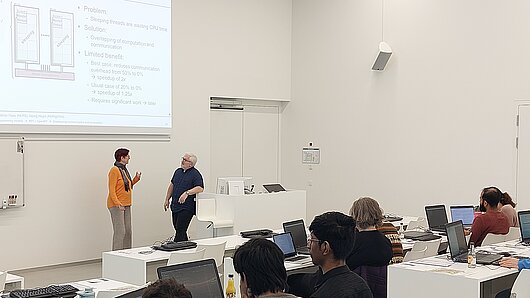Höchstleistungsrechenzentrum Stuttgart

10. Feb. 2026
10:45
12. Feb. 2026
13:00
Englisch
Fortgeschritten
ThemenbereicheProgrammiersprachen für wissenschaftliches Rechnen
ThemenCode-Optimierung
MPI
MPI+OpenMP
OpenMP
Learn more about course curricula and content levels.
Claudia Blaas-Schenner (ASC Research Center, TU Wien and EuroCC-Austria),
Georg Hager (NHR@FAU, University of Erlangen-Nuremberg),
Tobias Haas (HLRS, University of Stuttgart)
This course provides scientific training in Computational Science, focusing on hybrid programming techniques to efficiently optimize memory usage and communication on multi-core, multi-socket HPC systems, with and without accelerators.
The presentation times listed in the agenda are tentative.
----------- PRELIMINARY AGENDA -----------
1st day – Tuesday, 10 February 2026
10:45 Join in
11:00 Welcome
11:15 Introduction to Hybrid Programming in HPC – MPI+X
11:45 Programming Models
11:50 - MPI + MPI-3.0 Shared Memory
12:30 Lunch
14:00 - MPI + OpenMP lecture and hands-on - how to compile and start
15:15 Break
15:30 - MPI + OpenMP lecture and hands-on - how to do pinning
16:45 Q & A
17:00 End of first day
17:00 Social event on-site
2nd day – Wednesday, 11 February 2026
08:45 Join in
09:00 - continue: MPI + OpenMP
09:00 - Case study: Simple 2D stencil smoother
09:30 Hands-on - hybrid through OpenMP parallelization
10:45 Break
11:00 - Overlapping Communication and Computation
11:30 Hands-on - taskloops
12:15 - MPI + OpenMP Conclusions
12:30 Lunch
14:00 - MPI + Accelerators lecture and hands-on
15:15 Break
15:30 - MPI + Accelerators lecture and hands-on
16:45 Q & A
17:00 End of second day
3rd day – Thursday, 12 February 2026
08:45 Join in
09:00 Programming Models (continued)
09:05 - MPI + Accelerators lecture and hands-on
10:30 Break
10:45 - MPI + Accelerators lecture and hands-on
11:45 Break
12:00 Conclusions, Q & A, Feedback
13:00 End of third day (course)
A link to the course material (slides and exercises) will be available at course start
Besides the content of the training itself, an important aspect of this event is the scientific exchange among the participants. We try to facilitate such communication by
Register via the button at the top of this page.
This course will be hybrid, i.e. it will take place at HLRS on-site but it will also be possible to attend online. Participants, online as well as on-site, have to be aware and agree that they might appear in the live video stream taken by a camera in the back of the lecture room or by a webcam on laptops. We strongly recommend to attend this course on-site since on-site attendance is much more effective and efficient in our experience. Therefore we might give priority to on-site over online participants during registration.
Please be aware that the Zoom session will be recorded. You declare that you are aware of and consent to the recording by registering.
Registration closes on Sunday, 1 February 2026.
Late registrations after the registration phase are still possible according to the course capacity. We cannot guarantee a cluster account for the hands-on sessions for late registrations.
This course is free of charge.
Only participants from institutions belonging to EU and EU-associated countries or part of the EuroCC2 project can take part in this course.
Link to the EU and EU-associated (Horizon Europe) countries and the EuroCC website.
Our course fee includes coffee breaks (in classroom courses only).
Tobias Haas phone 0711 685 87223, training(at)hlrs.de
HLRS is part of the Gauss Centre for Supercomputing (GCS), together with JSC in Jülich and LRZ in Garching near Munich. SIDE is the German National Competence Centre (NCC) for High-Performance Computing. HLRS is also a member of the Baden-Württemberg initiative bwHPC.
Since 2025, HLRS has been coordinating one of the AI Factories of the EuroHPC JU: HammerHAI.
This is a joint training event of SIDE and EuroCC-Austria.
Within the scope of the EuroCC2 project this training is offered free of charge. By participating in a training free of charge, companies receive state-aid corresponding to the regular market-prices listed in the service portfolio. Please note state-aid regulations in Germany.
EuroCC 2 and EuroCC4SEE have received funding from the European High-Performance Computing Joint Undertaking (JU) under grant agreement No 101101903 and No 101191697. The JU receives support from the European Union’s Digital Europe Programme and Germany, Bulgaria, Austria, Croatia, Cyprus, Czech Republic, Denmark, Estonia, Finland, Greece, Hungary, Ireland, Italy, Lithuania, Latvia, Poland, Portugal, Romania, Slovenia, Spain, Sweden, France, Netherlands, Belgium, Luxembourg, Slovakia, Norway, Türkiye, Republic of North Macedonia, Iceland, Montenegro, Serbia, Bosnia and Herzegovina.


See the training overview and the Supercomputing Academy pages.
See also information about the HLRS training department and staff.
März 02 - 06, 2026
Dresden
Englisch
März 23 - Apr. 17, 2026
Hybrid, Stuttgart
Englisch
März 23 - 27, 2026
Hybrid, Stuttgart
Englisch
Apr. 21 - 24, 2026
Online
Englisch
Juni 01 - 02, 2026
Online
Englisch
Okt. 19 - 23, 2026
Stuttgart
Englisch
Okt. 19 - 23, 2026
Stuttgart
Englisch